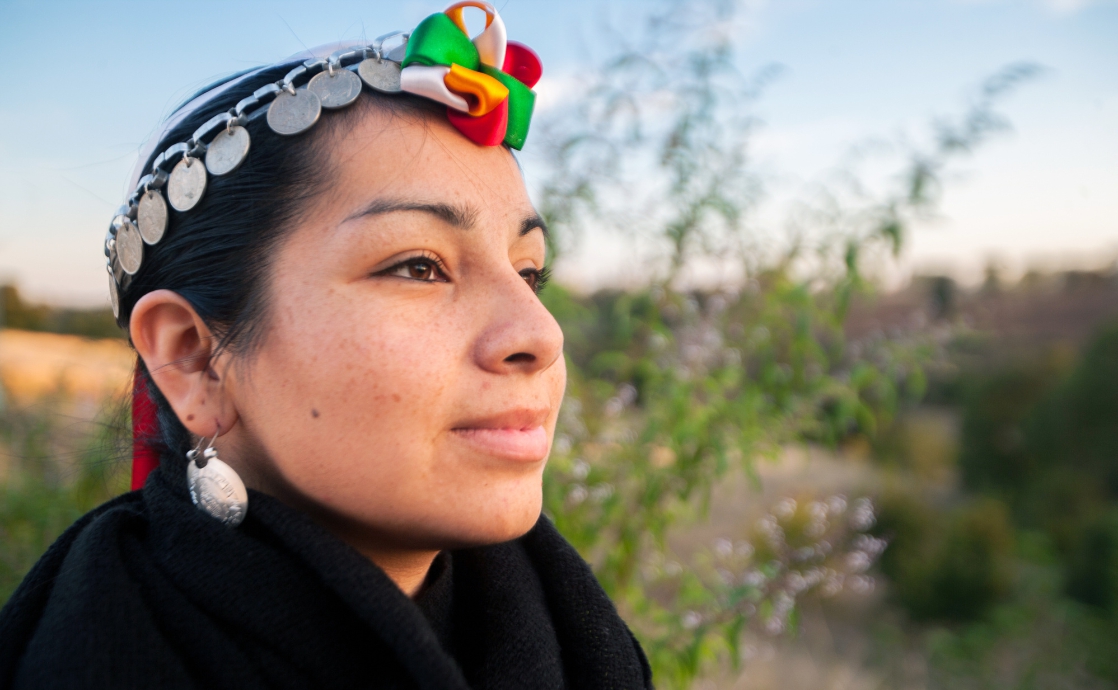The views expressed in our content reflect individual perspectives and do not represent the authoritative views of the Baha'i Faith.
Our bungalow, nearly hidden on a forested mountain overlooking Argentina’s Lago Nahuel Huapi, was under siege. Snow obscured the A-frame structure, the wind howled off the lake, and the foundation shook.
We sat huddled in overcoats against the bitter cold penetrating the tiny kitchen. Our children, Christopher and Leila, ages 2 and 8 months, looked on anxiously as we stared blankly at each other.
I had just arrived at our abode after nightfall. The four-kilometer trek to the village of Bariloche through near-blizzard conditions and knee-deep snow had exhausted me. In the coming weeks, I would succumb to the virus of a deep respiratory infection.
RELATED: What Are the Baha’i Teachings on Diversity?
Our funds were nearly depleted; I had clambered down the mountain in order to send a wire to the national secretary requesting a funds transfer.
A few weeks earlier, owing to economic instability in the country and its banking system, the national governing body of the Baha’i community in Argentina had advised us to entrust most of our funds with its treasurer for safekeeping. Whenever we needed an infusion from our banked funds, we could wire the treasurer from the post office in the village.
My snowy quest had been in vain, though.
Lacking any phone service, we did not anticipate a post office closure due to striking workers. Worn down from my trek, I could only bring the grim news of the strike to my family — and no money for food. Alone and isolated in the “Provincia de Rio Negro”, we found some consolation in Baha’u’llah’s assurance that we could call on the Creator for assistance:
Let trust in God be his shield, and reliance on God his provision, and the fear of God his raiment. Let patience be his helper, and praiseworthy conduct his succorer … Then will the concourse on high sustain him.
At that moment, however, our patience was dictated more by weariness than by faith. The immediate future did not appear promising.
Why were we, a young family from the United States, living in such remote and primitive conditions so far from the comforts of home?
We were Baha’i pioneers, determined to undergo these hardships to bring the teachings of the unity of humankind to the world’s peoples. We were not missionaries, imposing our beliefs on others or proselytizing a religion — instead, Baha’i pioneers go to new places to “live the life,” to quietly demonstrate the universality of the Baha’i principles of love and unity through action.
In those days, however, the economy of Argentina was critically unstable. Beset with shortages of goods and services, high inflation, widespread strikes, and political assassinations, the government of Isabel Peron was in grave peril. In a few months, a brutal military dictatorship would overthrow her government.
We had arrived in mid-1975 from our home in balmy Missouri. At the time of our arrival in Buenos Aires, we were largely unaware of the extent of the widespread unrest in Argentina. A New York Times article had pegged the rate of inflation at 335 percent. Another source gave 1,000 percent. On payday, panicked wage earners would rush to purchase needed food supplies before the next inevitable price increase.
In the first decades of the 20th century, an enviable saying of Europeans was to be as wealthy as an Argentine. However, after the Second World War, a decline in the fortunes of the country occurred. President Juan Peron had triggered rising inflation by promising wage increases to workers.
Surprisingly, our landlord provided us with some food until the postal strike ended. But soon, on a trumped-up charge, he had me arrested for theft and incarcerated in an open-air prison. His motive: to extract money from us.
Curious to know our circumstances, a local doctor advised me to consult the clinic’s legal counsel, and the lawyer was able to secure my release within hours. Subsequently, in the coming days, the charges were dismissed, and the landlord was considered a “rascal” by an attending officer.
A Mandate for World Unity
As Baha’is we well understood that the mission of Baha’u’llah is to establish the unity of humankind. Since Baha’u’llah came for all humanity, that oneness embraces every race, color, and class of people. This global embrace means that Baha’is are encouraged to settle in foreign lands as a way of learning about other cultures and spreading the healing message of Baha’u’llah through their actions.
For this purpose, Abdu’l-Baha, the son and successor of Baha’u’llah, provided a mission statement for the Baha’is in his Will and Testament, where he asked us to:
Consort with all the peoples, kindreds and religions of the world with the utmost truthfulness, uprightness, faithfulness, kindliness, good will and friendliness, that all the world of being may be filled with the holy ecstasy of the grace of Baha, that ignorance, enmity, hate and rancor may vanish from the world and the darkness of estrangement amidst the peoples and kindreds of the world may give way to the Light of Unity.
Abdu’l-Baha’s mandate for the spiritual regeneration of the world, called Tablets of the Divine Plan, addressed the North American Baha’i community of the United States and Canada after World War I. By the time our family went to Argentina, nearly 60 years later, the worldwide Baha’i community had expanded from 13 countries during the lifetime of Baha’u’llah to 35 under Abdu’l-Baha’s leadership, and over 300 by 1975.
Today, as a result of this global movement, Baha’is exist in every nation on Earth, and this relatively new Faith has become humanity’s second-most widespread religion.
Reaching the Indigenous Peoples of the Americas
Focusing his attention on Latin America in The Tablets of the Divine Plan, Abdu’l-Baha also emphasized the importance of reaching the Indigenous populations of the Americas:
Attach great importance to the indigenous population of America. For these souls may be likened unto the ancient inhabitants of the Arabian Peninsula, who, prior to the Mission of Muhammad, were like unto savages. When the light of Muhammad shone forth in their midst, however, they became so radiant as to illumine the world. Likewise, these Indians, should they be educated and guided, there can be no doubt that they will become so illumined as to enlighten the whole world.
In subsequent decades, the Faith would continue to emphasize the importance of reaching Indigenous peoples with Baha’u’llah’s message of unity and justice.
Following Columbus’s discovery of the New World, the conquistadors, armed with superior weaponry and disease-ridden bacteria, overwhelmed the Indigenous peoples of Latin America. As agents of imperialism, the Spanish and Portuguese overthrew the advanced civilizations built by the Indian peoples. Some 95 percent of their populations perished. Survivors were subjugated, enslaved, and maltreated as their conquerors extracted the wealth of their countries.
In a series of brutal conquests during the late 19th century, thousands of Mapuche, who had resisted Spanish conquest in Chile and Argentina, had been killed through combat, pillaging, and epidemics. Their traditional economy had collapsed, leaving many of them impoverished and forcing them to resettle on inhospitable land.
When we visited a group of Mapuche Indians in Playa Bonita (outside Bariloche), we found them huddled together in a crude wood structure insulated with burlap bags. A low bench surrounded the perimeter of the sitting room. Our feet resting on an earthen floor, our host filled a gourd with mate (matay) tea and boiling water, which was shared through a common metal straw.
RELATED: How Baha’is Believe We Can Achieve World Unity
Feeling overwhelmed by their simple kindness, we were drawn again and again to visit them. When my wife Nancy contracted hepatitis, and we were quarantined, our children had to be temporarily housed further south with a family recommended by the National Assembly. During our sequester, we were visited repeatedly by Domingos Collueque, the chief of a local Mapuche tribe who, untroubled by our contagion, served us.
Confronted by the specter of joblessness and homelessness, we prayed together in our isolation and resolved to stay at our pioneering post. It was a decision that appeared terribly foolish, but one that taught us the meaning of reliance upon God as our best provision. Within 48 hours of making that decision, we received an unexpected financial windfall that would carry us through another year.
During that coming year, we often visited the Mapuche in the rugged hills south of Bariloche. As a protection, their houses blended well into the wilderness. However, when approaching the neighborhood, one or the other Mapuche would emerge with welcoming hospitality.
How affected we were by these noble and trusting people!
As our second year neared its end, we had to return to our native land. Nancy was very pregnant with our third child. We yearned to stay in Argentina — but when our son was born, the attending doctor thought both mother and child would have died of complications had we stayed.
We put our trust in God during our time in that land, and God repaid us with the kindness and deep spirituality of the Mapuche people.
















Comments
Sign in or create an account
Continue with Googleor